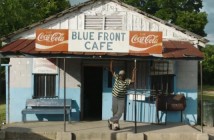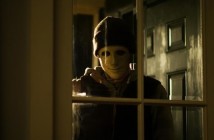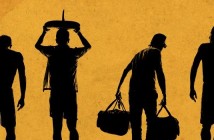Cast: Johnny Depp, Armie Hammer, William Fichtner
Director: Gore Verbinski
Country: USA
Genre: Action | Adventure | Western
Official Trailer: Here
Editor’s Notes: The Lone Ranger opens wide today, July 3rd. Check your local listings for showtimes.
Gore Verbinski has been the subject of some pretty ridiculous Tim Burton comparisons in recent years, based primarily on the fact that he has worked with Johnny Depp a bunch of times. There are elements of skewed oddity that might parallel the two filmmakers as well, though Verbinski has consistently mined the depth and complexity behind his quirkiness, whereas Burton’s movies play like inside jokes that are no longer funny or relevant.
…it’s a one-joke, one-note lark that only exists to facilitate awkward comedy in an Old West setting…and, of course, so Johnny Depp can fulfill his desire to wear a dead bird on his head.
 With that said, The Lone Ranger presents a disturbing development in the Verbinski/Burton comparison. Put simply, The Lone Ranger is the first Verbinski-Depp collaboration that could be easily mistaken for a Burton-Depp collaboration; it’s a one-joke, one-note lark that only exists to facilitate awkward comedy in an Old West setting…and, of course, so Johnny Depp can fulfill his desire to wear a dead bird on his head. Deep has mentioned that the inspiration for his bird-on-head iteration of Tonto is a Kirby Sattler painting titled “I Am Crow,” and the resulting character – and the film itself – is about as shallow and empty as such a left-field, unrelated, purely idiosyncratic inspirational choice might indicate.
With that said, The Lone Ranger presents a disturbing development in the Verbinski/Burton comparison. Put simply, The Lone Ranger is the first Verbinski-Depp collaboration that could be easily mistaken for a Burton-Depp collaboration; it’s a one-joke, one-note lark that only exists to facilitate awkward comedy in an Old West setting…and, of course, so Johnny Depp can fulfill his desire to wear a dead bird on his head. Deep has mentioned that the inspiration for his bird-on-head iteration of Tonto is a Kirby Sattler painting titled “I Am Crow,” and the resulting character – and the film itself – is about as shallow and empty as such a left-field, unrelated, purely idiosyncratic inspirational choice might indicate.
“But WAIT!” you say. “Jack Sparrow was inspired by Keith Richards and look how that turned out!” Well yes, that’s true, but the surface inspiration wasn’t what made Depp’s most notable blockbuster character so special. The character as written was infinitely more complex and engaging, and the myth of Richards – which, unlike a still painting, offered a persona with quirks and mannerisms – lent Depp something tangible on which he could riff. Not so here – the inspiration is not as ebullient and the writing certainly isn’t as strong. How odd, then, that Ted Elliot and Terry Rossio, the two original Pirates of the Caribbean scribes, contributed to this Lone Ranger screenplay. The problem, I think, is that, with such a flimsy basis as a radio serial, the filmmakers aimed to form the Lone Ranger story to the ready-made mold of the successful Pirates movies. Unfortunately, The Lone Ranger comes off as a pale imitation of the latter two Verbinski-directed Pirates entries – every bit as bloated, but nowhere near as creative or fun.
Clearly, something did need to be done to make this material relevant and engaging for a modern audience. After all, the basis for this wannabe franchise is a radio serial that started in 1933 and hasn’t been broadcast – on radio or TV – in over 50 years. Maybe it was Verbinski’s idea of a joke to “make the material relevant” by tacking on a needlessly complicated story with seemingly endless minutiae and curiously brutal violence. I know Verbinski and Depp previously pushed the limits of the Disney tolerance level with the original Pirates films, but this one could’ve contended for the historic position of being the studio’s first-ever R-rated film. All the close-range shooting and vicious stabbing has certainly tarnished that old wholesome Disney logo…mainly with all the splattered blood.
I know Verbinski and Depp previously pushed the limits of the Disney tolerance level with the original Pirates films, but this one could’ve contended for the historic position of being the studio’s first-ever R-rated film.
 Of course, certain inappropriate elements would be easier to forgive if the film was entertaining…but for most of the way, it’s an overlong slog. Not that there are a great many intricacies to this plot; to the contrary, the story consists basically of the inactive titular hero (Armie Hammer), who is…kinda wimpy…and forced into a hero role after his more heroic brother is slain, and not-so-loyal sidekick Tonto (Depp), who wants to kill the wily villain (a wonderfully grisly William Fichtner), who really just wants a bunch of money. In between, there are a lot of hazy conversations sitting around a campfire, some bloviating fake mysticism, and a Helena Bonham Carter appearance, in another strange Burton-esque stroke.
Of course, certain inappropriate elements would be easier to forgive if the film was entertaining…but for most of the way, it’s an overlong slog. Not that there are a great many intricacies to this plot; to the contrary, the story consists basically of the inactive titular hero (Armie Hammer), who is…kinda wimpy…and forced into a hero role after his more heroic brother is slain, and not-so-loyal sidekick Tonto (Depp), who wants to kill the wily villain (a wonderfully grisly William Fichtner), who really just wants a bunch of money. In between, there are a lot of hazy conversations sitting around a campfire, some bloviating fake mysticism, and a Helena Bonham Carter appearance, in another strange Burton-esque stroke.
The actors do what they can, in limited capacity. Depp is allowed only a fraction of his usual bravado, instead recoiling into mere strangeness. Hammer is charming even though he is made to portray a wilting wallflower. Fichtner is awesome, though barely recognizable…and he might make some little kids cry. Actors’ goodwill means nothing in the context of The Lone Ranger, however, since it spends the entire running time filling plot lulls with tiresome interludes. The film is also bookended with a scene in which a bright-eyed festival attendee encounters an older Tonto in a historical exhibit. Tonto comes to life, Night at the Museum-style, albeit without the imaginative spirit and playful whimsy. The sequence has neither payoff nor consequence, but rather plays out in random stretches where the screenwriters apparently became bored of the legitimate film action. I feel their pain.
[notification type=”star”]42/100 ~ BAD. The actors do what they can, in limited capacity. Depp is allowed only a fraction of his usual bravado, instead recoiling into mere strangeness. Hammer is charming even though he is made to portray a wilting wallflower. Fichtner is awesome, though barely recognizable…and he might make some little kids cry. Actors’ goodwill means nothing in the context of The Lone Ranger, however, since it spends the entire running time filling plot lulls with tiresome interludes.[/notification]



